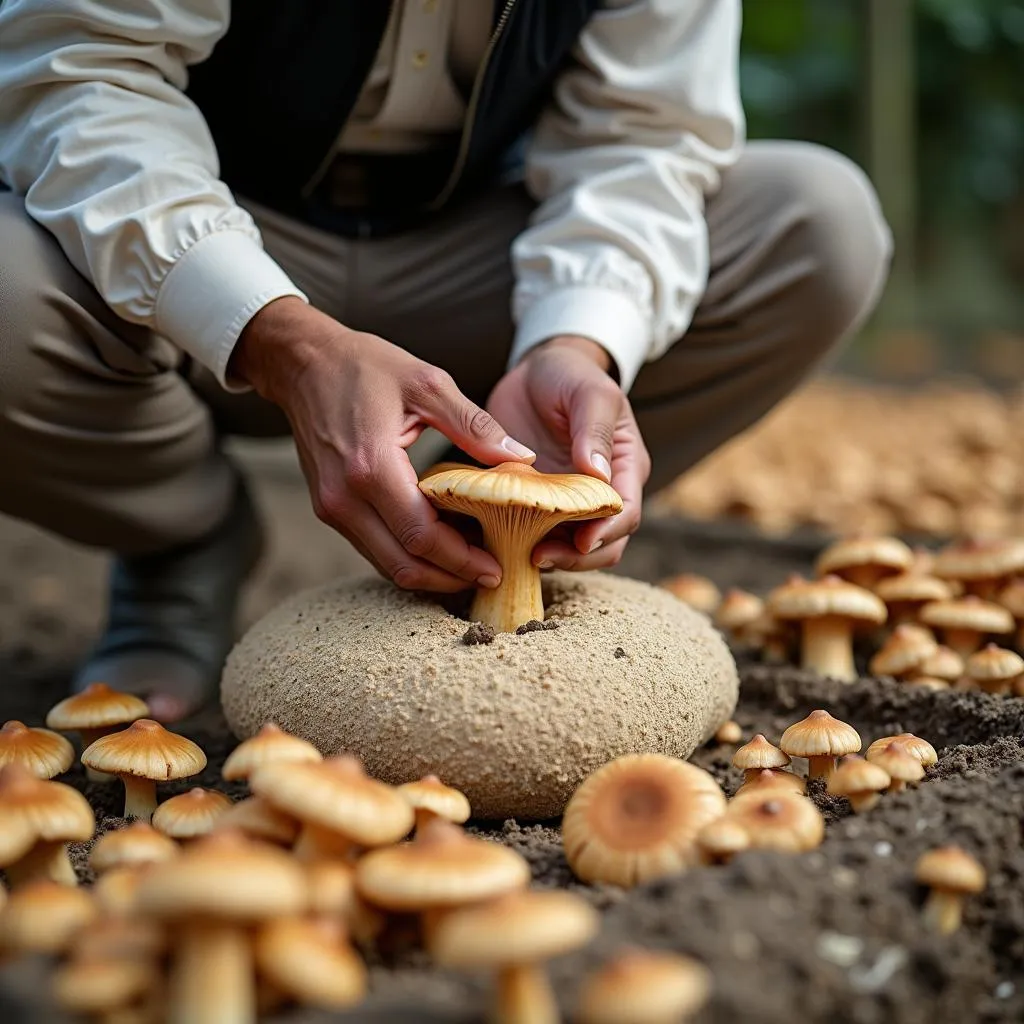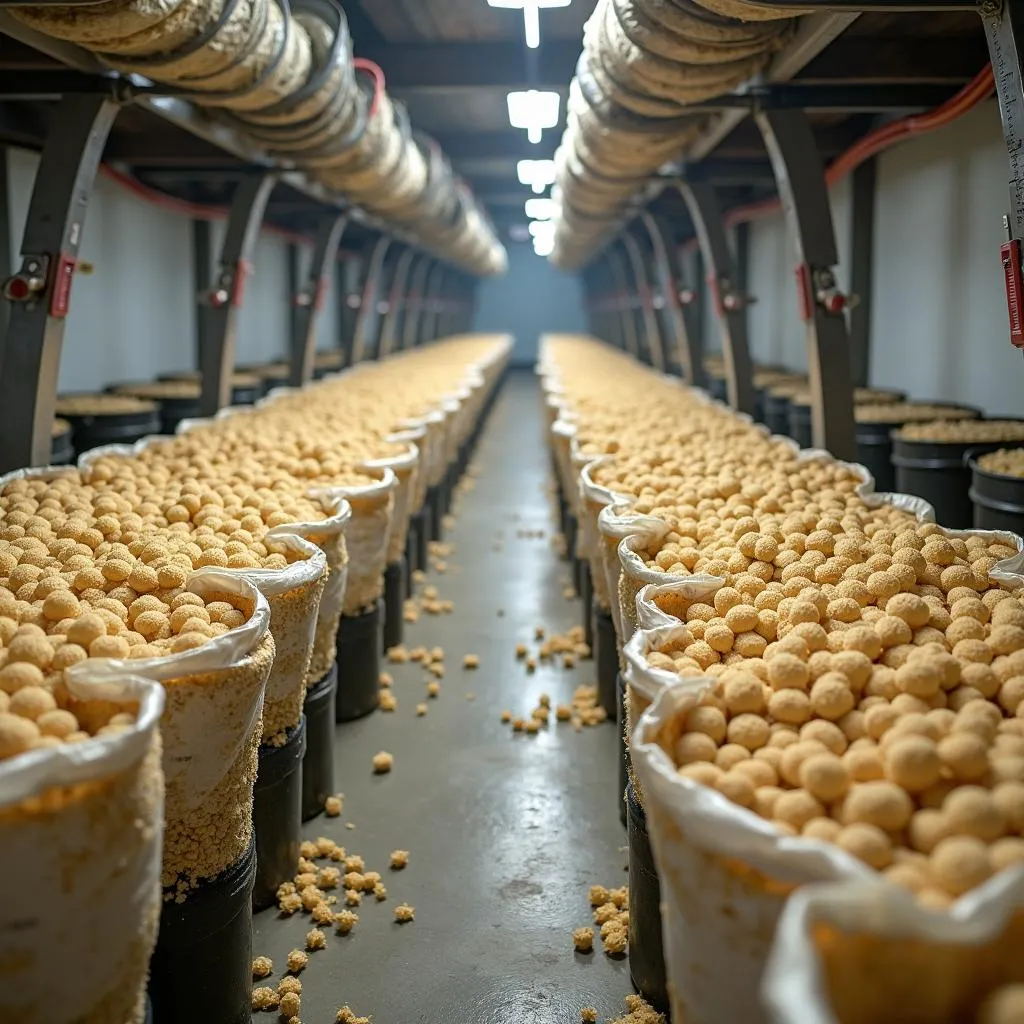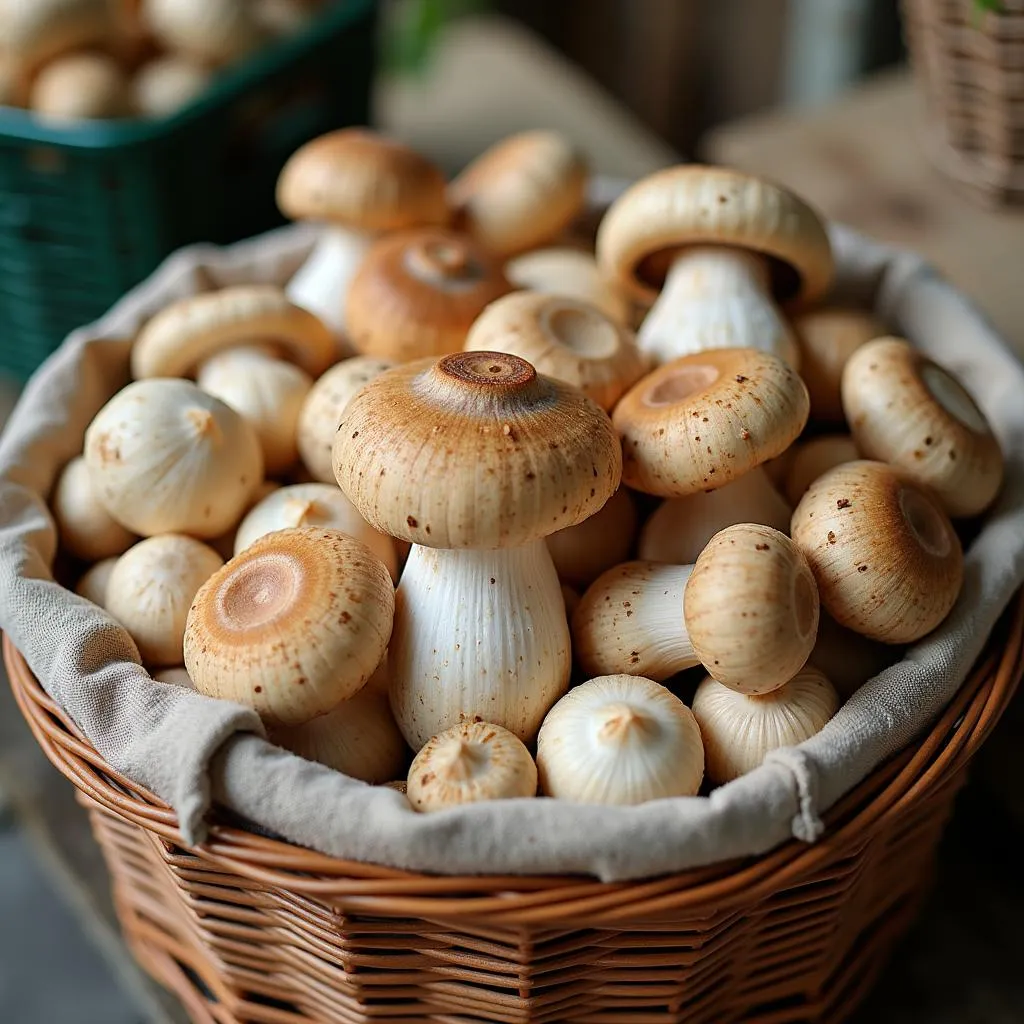Mushroom Farming In Pakistan is rapidly gaining popularity as a profitable and sustainable agricultural venture. With its suitable climate and growing demand for mushrooms, Pakistan offers a fertile ground for this niche market. This comprehensive guide delves into the intricacies of mushroom farming in Pakistan, providing aspiring cultivators with the knowledge and insights they need to succeed.
Why Mushroom Farming in Pakistan?
Pakistan’s diverse climate, ranging from the cool, humid north to the warm, arid south, allows for the cultivation of a variety of mushroom species year-round. This geographical advantage, coupled with the rising demand for mushrooms in local and international markets, makes mushroom farming a lucrative opportunity for Pakistani farmers.
 Pakistani Farmer Harvesting Oyster Mushrooms
Pakistani Farmer Harvesting Oyster Mushrooms
Choosing the Right Mushroom Variety
Selecting the right mushroom variety is crucial for successful cultivation. Popular choices in Pakistan include:
- Oyster Mushrooms: Known for their fast growth and adaptability to various substrates.
- Button Mushrooms: The most commonly consumed variety, requiring a controlled environment.
- Shiitake Mushrooms: Prized for their medicinal properties and unique flavor.
- Paddy Straw Mushrooms: Thriving in warm climates, often cultivated on rice straw.
Factors to consider when choosing a variety include local market demand, climate suitability, and available resources.
Setting Up Your Mushroom Farm
Mushroom cultivation doesn’t require vast land areas, making it ideal for small-scale farmers. Here’s a step-by-step guide to setting up your mushroom farm:
- Choose a Location: Select a well-ventilated, shaded area with access to clean water and electricity.
- Prepare the Substrate: Mushrooms grow on a variety of substrates like straw, sawdust, and cotton waste. Proper substrate preparation, including pasteurization, is essential to eliminate competing organisms.
- Inoculation: Introduce mushroom spawn, which contains the mushroom mycelium, into the prepared substrate.
- Incubation: Maintain optimal temperature and humidity levels during the incubation period for mycelium growth.
- Fruiting: Once the substrate is fully colonized, induce fruiting by adjusting temperature, humidity, and fresh air.
- Harvesting: Harvest mushrooms at their peak maturity, typically within a few weeks of fruiting.
 Indoor Mushroom Farm in Pakistan
Indoor Mushroom Farm in Pakistan
Marketing and Selling Your Mushrooms
With a fresh and high-quality product, marketing your mushrooms becomes straightforward:
- Local Markets: Establish connections with local vegetable vendors and supermarkets.
- Restaurants: Partner with restaurants seeking fresh, locally sourced ingredients.
- Online Platforms: Utilize e-commerce platforms and social media to reach a wider audience.
Highlight the health benefits and culinary versatility of mushrooms to attract customers.
Challenges and Solutions in Mushroom Farming
Like any agricultural endeavor, mushroom farming presents its share of challenges:
- Pest and Disease Control: Implement strict hygiene practices and monitor for common pests and diseases.
- Maintaining Optimal Conditions: Invest in temperature and humidity control systems, especially for varieties like button mushrooms.
- Market Fluctuations: Diversify your mushroom varieties and explore value-added products like dried mushrooms or mushroom powders.
The Future of Mushroom Farming in Pakistan
Mushroom farming in Pakistan holds immense potential for growth and innovation:
- Value-Added Products: Explore opportunities in producing mushroom-based snacks, supplements, and medicinal products.
- Organic Certification: Tap into the growing demand for organic produce by obtaining organic certification.
- Export Potential: Target international markets with high demand for specialty mushrooms.
Conclusion
Mushroom farming in Pakistan presents a lucrative opportunity for individuals passionate about agriculture and seeking a sustainable source of income. By following best practices, choosing the right varieties, and implementing effective marketing strategies, aspiring mushroom cultivators can tap into this thriving market and contribute to Pakistan’s agricultural landscape.
FAQs
1. What is the initial investment required for mushroom farming?
The initial investment varies based on farm size and technology. However, it’s relatively lower compared to other agricultural ventures.
2. How long does it take to harvest mushrooms?
Depending on the variety, it can take anywhere from a few weeks to a couple of months from inoculation to harvest.
3. Where can I get training for mushroom cultivation?
Several government and private institutions offer training programs on mushroom farming techniques.
 Freshly Harvested Mushrooms Ready for Market
Freshly Harvested Mushrooms Ready for Market
4. Is mushroom farming environmentally friendly?
Yes, mushroom cultivation utilizes agricultural waste and promotes sustainability by converting organic matter into food.
5. What are the health benefits of consuming mushrooms?
Mushrooms are low in calories, rich in vitamins and minerals, and possess antioxidant and immune-boosting properties.
Need further assistance? Reach out to our team at +923337849799, email us at news.pakit@gmail.com, or visit us at Dera Ghazi Khan Rd, Rakhni, Barkhan, Balochistan, Pakistan. We’re here to help you 24/7.